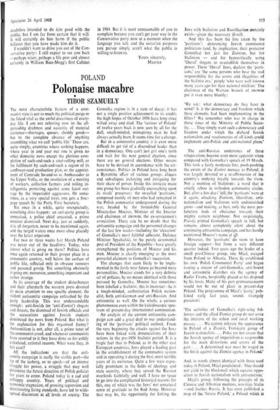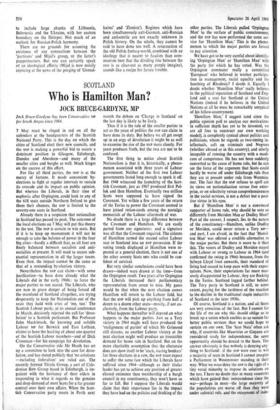Polonaise macabre
POLAND TIBOR SZAMUELY
The most characteristic feature of a com- munist state is not so much the political purge or the faked trial as the awful dreariness of every-
day life. I am not referring now to the all- pervading drabness and austerity of material existence—shortages, queues, shoddy goods—
but to the complete absence of anything resembling what we call 'public life.' These are, quite simply, countries where nothing happens, where year in and year out one is given no other domestic news except the glorious com- pletion of such-and-such a steel-rolling mill, or the fulfilment by such-and-such a region of its sunflower-seed production plan, or the appoint- ment of Comrade So-and-so as Ambassador to the Upper Volta, or the resolution of a meeting of workers, collective farmers and toiling in- telligentsia protesting against some latest out- rage by the imperialist aggressors. Or some- times, as a very special treat, one gets a four- page speech by the Party First Secretary.
Yet once in a while, quite unexpectedly, something does happen : an anti-party group is unmasked, a police chief executed, a prime minister dismissed. Next day, just as suddenly, it is all forgotten, never to be mentioned again, and the turgid waters once more close placidly over the latest unperson.
For two or three weeks last March Poland was never out of the headlines. Today, who knows what is going on there? Politics have once again returned to their proper place in a communist country, well below the surface of public life, reflected only in obscure rumours and personal gossip; Yet something obviously is going on; moreover, something important and rather strange.
In its coverage of the student disturbances and their aftermath the western press devoted its main attention to one specific element, the violent antisemitic campaign unleashed by the party leadership. This was understandable enough: anti-Jewish (or 'anti-Zionist) slogans and threats, the dismissal of Jewish officials and the accusations against Jewish students dominated the news from Poland. But what is the explanation for this organised frenzy?
Antisemitism is not, after all, a prime tenet of the communist creed, and whenever communists have resorted to it they have done so for coldly calculated, rational reasons. What were they, in this case?
All the indications are that the anti- Semitic campaign is really the visible part—the tip of the iceberg, so to speak—of an intense struggle for power, a struggle that may well determine the future direction of Polish policies for years to come. Poland today is a sad and unhappy country. Years of political and economic'stagnation, of growing repression and deteriorating living standards, have led to wide- spread discontent at all levels of society. The Gomulka regime is in a state of decay; it has not a single positive achievement to its credit; the high hopes of October 1956 have long since wilted away and died. The 'saviour of Poland' of twelve years back is now seen by all for the dull, small-minded, uninspiring man he had always actually been. It seems time for a change.
But in a communist country it is even more difficult to get rid of a discredited leader than in a democracy. One can't just grit one's teeth and wait for the next general election, since there are no general elections. Other means have to be devised in accordance with the cir- cumstances. Politics in Poland have long been a Byzantine affair of various groups, cliques and sub-cliques jockeying and intriguing for their share of power. Inside this intricate maze one group has been gradually encroaching upon its rivals' preserves: the so-called 'partisans,' composed mainly of men who had remained in the Polish communist underground during the war, headed by the formidable General Mieczyslaw Moczar, Minister of the Interior and chairman of ZBOWID, the ex-servicemen's association. There can be no doubt that the antisemitic campaign and.the personnel changes of the last few weeks—including the 'elevation' of Gomulka's most faithful adherent, Defence Minister Spychalski, to the purely ceremonial post of President of the Republic—have greatly strengthened the positions of Moczar and his men. Moczar is clearly emerging as the most powerful claimant to Gomulka's succession.
The changes that seem likely to be imple- mented in the fairly near future go beyond mere personalities. Moczar stands for a very definite set of policies, by no means identical with those pursued by Gomulka. Moczar has sometimes been labelled a Stalinist; this is incorrect—he is a tough-minded, authoritarian Polish nation- alist, both anti-German and anti-Russian. And antisemitic as well. On the whole, a curious phenomenon even within the kaleidoscopic spec- trum of present-day international communism. . An analysis of the current antisemitic cam- paign can add a great deal to our understand- ing of the 'partisans' political outlook. From the very beginning the attacks against the Jews have been linked with denunciations of their actions in the pre-1956 Stalinist period. It is a tragic fact that in Poland, as in the other east European countries, Jews played a leading part in the establishment of the communist system and in operating it during the first, most terrible years of its existence. Quite a few were espec- ially prominent in the fields of ideology and state security, where they served the Russian overlords faithfully and well. I have no space to go into the complicated historical reasons for this, one of which was the Jews' not unnatural sense of gratitude to the Red Army. However that may be, the opportunity for linking the
Jews with Stalinism and Russification certainly exists—given the necessary
And this has been the line taken by the 'partisans': denouncing Jewish communist politicians (and, by implication, their protector Gomulka) not just for Zionism, but for Stalinism — and for hypocritically using `liberal' slogans to re-establish themselves in power. These 'liberal' Jews, declare the 'parti- sans,' are 'the same persons who bear the real responsibility for the errors and illegalities of the Stalinist era,' people 'who were well known many years ago for their national nihilism.' The chairman of the Warsaw branch of ZBOWID put it even more bluntly: 'We ask : what democracy do they have in mind? Is it the democracy and freedom which these elements had been implementing in the fifties? We remember who was in charge in those times of the Ministry of Public Secur- ity.... They simply want such a democracy and freedom under which the diehard Jewish nationalists and reactionaries of all kinds could implement anti-Polish and anti-national plans.'
The anti-Russian undertones of these vituperations become even more apparent when compared with Gomulka's speech of 19 March. This took a fairly moderate line, pooh-poohing the extent of the Zionist menace to Poland; it was largely devoted to a re-affirmation of the country's undying loyalty towards the ussa. Not a mention of Stalinism : a word that is strictly taboo in orthodox communist circles. But, after a few days' lull, the 'partisans' were at it again, attacking Zionism, liberalism, anti- nationalism and Stalinism with undiminished gusto—and making. at best, only the most per- functory nods of obeisance towards their mighty eastern neighbour. Not surprisingly, Pravda printed Gomulka's speech in full, but remains almost completely silent about the continuing antisemitic campaign, and has hardly mentioned Moczar's name at ;II.
However, the `partisans' do seem to have foreign support—but from a very different quarter indeed. Two years ago the leader of a small pro-Chinese group, one Mijal, escaped from Poland to Albania. There lie established his own 'Polish Communist Party' and began issuing a stream of anti-Gomulka, anti-Soviet and antisemitic diatribes via the agency of Radio Tirana, hospitably placed at his disposal by his hosts. Many of his past pronouncements would not be out of place in present-day Poland. The programme of Mijal's 'party,' pub- lished early last year, sounds strangely prescient: `The activities of Gomulka's right-wing fol- lowers and the allied Zionist group do not serve the interests of the urban and rural working masses. . . . We cannot tolerate the appearance in Poland of a Zionist, Trotskyite group of Jewish nationalists.... Poles are not aware that the Jewish agency of imperialism is responsible for the main distortions and errors of the past. : . . A determined war must be waged to the finish against the Zionist agency in Poland.'
And, in words almost identical with those used today in Poland, Mijal proclaimed : 'One should not yield to the blackmail which equates oppo- sition to Jewish nationalism with antisemitism.'
Mijal's group, following the precepts of its Chinese and Albanian mentors, worships Stalin —and loathes Russia. It has even published a map of the 'future Poland,' a Poland which is to include large chunks of Lithuania, Belorussia and the Ukraine, with her eastern boundary on the Dnieper. Not much of an outlook for Russian-Polish harmony.
There are no grounds for assuming the existence of any connections between the 'partisans' and Mijal's group, or the latter's puppetmasters. But one can certainly speak of an ideological affinity (Mijal is now noisily rejoicing at the news of the purging of `Gomul- kaites' and 'Zionists'). Regimes which have been simultaneously anti-German, anti-Russian and antisemitic are not exactly unknown in Polish history. On the whole, they cannot be said to have done too well. A resurrection of the old Polish fantasy-world, combined with an ideology that is nearer to fascism than com- munism (not that the dividing line between the two is as clear-cut as many people imagine), sounds like a recipe for future trouble.







































 Previous page
Previous page